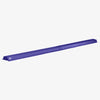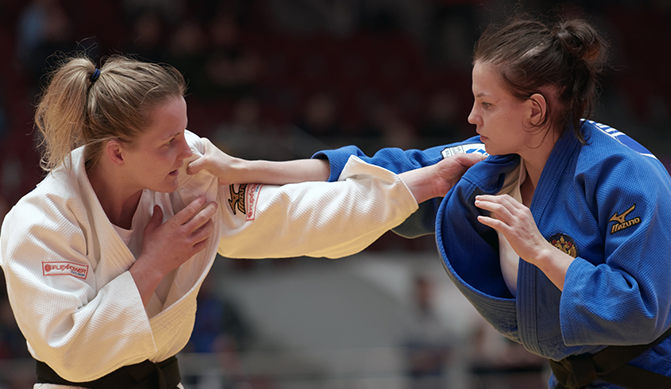Now that the top Judo athletes from each participating country have been decided, the world patiently waits to see the best make their mark at the 2021 Tokyo Olympics taking place from July 23rd to August 8th.
In honor of the 29th summer Olympic games, let’s take a closer look at the art of Judo, what it is, when it became an Olympic sport, and what you need to know when watching the matches this July. Then, we’ll show you the perfect martial arts mats for practicing your own Judo skills at home while you tune in to see the countries top athletes compete against each other for the title of world champion.
Judo: The Way of Suppleness
Created in 1882 Japan by Kano Jigoro Shihan, Judo (a Japanese word meaning “the way of suppleness'') was born from the immersion of several Jiu Jitsu and martial arts practices.
This traditional Japanese wrestling sport aims to teach judoka (students of Judo) the art of self-defense without hurting their opponent since classic martial arts techniques were designed to hurt or kill in battle. For this reason, Judo does not involve kicking, punching, striking, pressure application to the joints (to throw an opponent), equipment, or weapons.
Instead, judokas use balance, power, movement, and mind to subdue each other, having only their judogis (judo uniforms) to grip onto. In fact, the Kodokan Judo Institute describes the essence of the sport in the following way:
“Beyond competitions and combat, Judo involves technical research, practice of katas (individual training), self-defense work, physical preparation, and sharpening of spirit.”
Judo in the Olympics
After being named a demonstration sport in the 1940 Tokyo Olympic games, Judo was abruptly canceled due to the conflicts of World War II. It was then reintroduced as an official Olympic sport in 1964.
Since then, Japan has produced 39 gold medals: France (14), South Korea (11), and China (8). The United States Judo team has brought home 2 Olympic gold medals in the 2012 and 2016 Olympics by half-heavyweight judoka Kayla Harrison.
How Long Are Olympic Judo Matches?
At the Olympic games, Judo matches are five minutes long for men and four minutes for women for a total of one match. Once the match ends, judokas adjust their judogis, face one another, and wait for the referee to announce the winner. If there is no winner at the end of the round, judokas will compete in a sudden-death overtime match.
How Are Olympic Judo Matches Scored?
Judo matches are broken up by weight class and scored based on three factors: Ippon, Waza-ari, and Yuko used to calculate a judoka’s score. Let’s break these down in more detail:
Ippon (100 points)- Ippon is awarded when a judoka performs a full throw in which their opponent is thrown with considerable force and speed, with the opponent landing largely on their back. An ippon can also be a move that immobilizes the opponent with a grappling hold-down for 20 seconds, when the opponent gives up, or passes out. If an ippon occurs, the match ends immediately, and the referee will signal with their arm straight up in the air.
Waza-ari (10 points)- Waza-ari is awarded when a judoka performs a throw with power and dominance. Generally, this powerful throw will lack speed, force, or a result where the opponent did not land with most of their back to the ground. A judoka can also be awarded a waza-ari if they immobilize their opponent for 15 seconds or more. Two waza-aris equals one ippon, and if achieved, will end the match, with the referee signaling the end of the match with an arm out at shoulder level from their side.
Yuko (1 point)- Yuko, or “almost waza-ari,” is awarded to a judoka for a throw that is lacking a majority of the ippon elements of speed, force, or inability to put the opponent on their back. A yuko will be awarded to a judoka if they immobilize their opponent for 10 seconds or more. If a yuko is achieved, the referee will signal with their arm at a 45-degree angle.
Are There Penalties in Olympic Judo?
There are two levels of penalties in Judo, the Hansoku-make, and the Shido. Hansoku-make is the most serious penalty in which the judoka will be immediately disqualified. This may include unsportsmanlike conduct, repeated rule violations, or intentionally trying to injure the opponent.
A shido penalty does not merit disqualification, but after three warning shidos a fourth will result in disqualification, and the match will end. This may include non-combative fighting or not fighting defensively enough, stepping out of bounds intentionally, or putting a hand in the opposing judoka’s face.
The highest quality of score will win their match.
Want to Practice Judo at Home? We’ve Got What You Need!
Watching the Olympics can certainly spark up inspiration to get up and get moving. If you’ve got your own little Judo master at home, or want to start learning the “ways of suppleness” on your own, we’ve got the martial arts mats, wrestling mats, and crash pads to help you get started.
Our various crash pads will make you feel safe and secure as you learn the ropes of hand-to-hand combat, and a 10x10 EZ FLEX home wrestling mat will help you hone in on your skills with clearly marked starting lines and a 1.25'' thick surface.
Whether you’re a dedicated judoka, weekend warrior, or want to brush up on your fitness in a fun and functional way, We Sell Mats™ has what you need to make it happen, all while rooting for your home country as you do it. Shop today!




